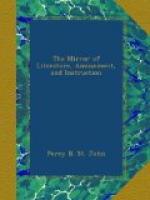General Washington, when called upon to sign his death-warrant, which he did not do without hesitation, it is said, dropped a tear upon the paper, and spoke at the same time to the following effect:—“That were it not infringing upon the duty and responsibility of his office, and disregarding the high prerogative of those who would fill that office after him, the tear, which now lay upon that paper, should annihilate the confirmation of an act to which his name would for ever stand as a sanction. He was summoned that day to do a deed at which his heart revolted; but it was required of him by the justice of his country, the desires and expectations of the people: he owed it to the cause in which he was solemnly engaged, to the welfare of an infant confederacy, the safety of a newly organized constitution which he had pledged his honour to protect and defend, and a right given to him that was acknowledged to be just by the ruling voice of all nations.”
Andre, after he had heard his condemnation, addressed a letter to Washington; it contained a feeling appeal to him as a man, a soldier, and a general, on the mode of death he was to die. It was his wish to be shot. This, however, could not be granted: he had been taken and condemned as a spy, and the laws of nations had established the manner of his death. But where were the humanity and feeling of the British on this occasion? Why did they not give up the dastardly Arnold in exchange for the brave Andre; as it was generously proposed by the United States?[3] This they refused on a paltry plea, and suffered, in consequence, the life of one of their finest officers to be ignominiously lost.
On a green eminence, over which hangs the dark and funereal shade of the willow, is the grave of this unfortunate soldier; it is a short distance south and west of the village. “No urn nor animated bust,” only a few rough and unshapely stones, without a word of inscription, and carelessly laid upon a mound of rudely piled earth, are shown to the traveller as the spot where rest the remains of poor Andre.[4]
Mag. Nat. Hist.
[3] Arnold was a General in
the American service, and had
distinguished
himself on former occasions like a brave soldier,
an
experienced commander, and a sincere citizen; but,
like
another
Judas Iscariot, he afterwards thought fit to turn
traitor.
He deserted to the English as soon as the news reached
him
of the apprehension of Andre (because he knew then
that his
name
and the plans arranged previously between him and the
British
General would be exposed and frustrated,) with the
expectation
of receiving a few pieces of silver for
betraying
his country. Whatever was his recompense in this
way
I
know not, but I am certain he was despised as long
as he lived,
and
his memory will for ever be pointed at as contemptible
and
degrading
by the people of both nations.




